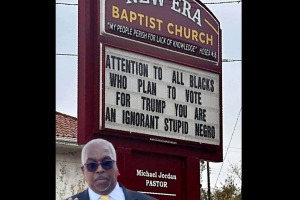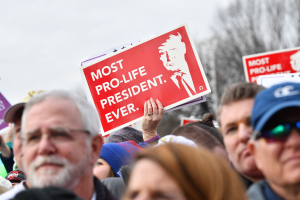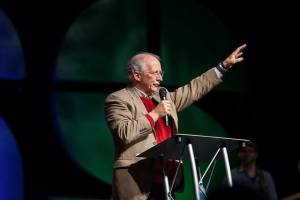Christian Broadcasters Urged to Fight 'Gay is the New Black' Agenda
NASHVILLE, Tenn. – Pastor and cultural apologist Voddie Baucham challenged Christian broadcasters at their annual convention on Saturday to not buy into the "gay is the new black" propaganda, but instead to remain committed to defending biblical marriage on the airwaves.
Baucham, who preaches at Grace Family Baptist Church in Spring, Texas, knew that he would make a lot of people uncomfortable or squirm in their seats by raising the issue of homosexuality at the opening session of the 2011 National Religious Broadcasters.
"When it comes to Christian broadcasters, we are nervous, even afraid to deal with this subject matter," he told NRB attendees at the Gaylord Opryland Resort and Convention Center.
The African-American minister pointed out that Christian broadcasters feel the need to apologize several times to the public before speaking about homosexuality on their shows. They will try to prove they don't hate gay people by saying they have many gay friends or gay family members, he said.
"The reason is the homosexuals have effectively co-opted blackness…to where now, we actually believe gay is the new black and we actually believe homosexual marriage is a civil rights issue," he explained.
He stressed, however, that being gay is not the same as being black.
"I'm insulted that people equate not just a sinful behavior but a behavior that's a special category of sin called abomination with the level of melanin in my skin," he said.
That discomfort, according to Baucham, is an intentional result of an aggressive homosexual agenda that started over 2 decades ago.
Back in 1989, a meeting took place among 144 of the nation's leading homosexual activists to figure out how to leverage the AIDS crisis to their advantage and to outline a strategy for advancing the LGBT movement.
One of the end products of that meeting was "After the Ball," a propaganda campaign based on principles of psychology and advertising to get America to accept homosexuality, said Baucham.
The campaign was a three-prong approach involving "desensitizing," "jamming," and "conversion," he explained.
Desensitizing meant getting homosexuality in front of the culture in attractive forms such as portraying a gay character in a movie to be the smartest and best-dressed character. Jamming is about equating the idea of being against homosexuality with the idea of being a Nazi or a member of the KKK in order to breed discomfort among people who don't accept homosexuality. Conversion is getting people to advance their cause.
Baucham provided several examples of how this strategy is carried out by not just homosexual activists but by black leaders, judges, business leaders, and religious leaders.
He lamented that black leaders were providing "cover" for homosexual activists to play the "race card" instead of giving a legitimate reason for their demands.
To religious leaders, he cautioned them against falling victim to three common attacks in the homosexual agenda: the ad hominem attack, the question-begging logic and genetic fallacy.
With the ad hominem attack, homosexual activists attack the man and label them a "homophobe" or "bad person" and with the question-begging logic tactic they only assume gay marriage is a fundamental right without ever proving it. Genetic fallacy is used when homosexual activists say, "you are using your religion to impose your morality on me," thereby rejecting the argument simply based on where it comes from, not based on the logic of that argument.
Reading from several Bible verses, Baucham contended that Christians should respond to homosexuality with biblical truth. Some Christians may point to the verse that says not to judge others to justify their silence, he acknowledged, but they should also read the part where Jesus tells us to judge ourselves so that we can judge others.
"Take the log out of your own eye so that you can see clearly to take the speck out of your brother's eye. We're commanded to judge," said Baucham.
Referring to Ezekiel 33, the pastor reminded the Christian media professionals that the blood will be required on their hands if they don't tell the wicked man to turn from his ways.
Showing true love, argued Baucham, is not to just allow homosexuals to live in sin but to call them to repent and speak of what Christ has done on the cross.
"There is nothing more loving than calling a person to repent of their sins."
During the evening session on Saturday, Frank Wright, president and CEO of National Religious Broadcasters, also addressed the crowd to give the status of the association report. He outlined the three main challenges facing Christian broadcasters today: media access, viewpoint discrimination and biblical fidelity.
Jay Sekulow, chief counsel of the American Center for Law and Justice, gave updates on how his legal group is defending religious freedom around the world from Pakistan to New York to Zimbabwe.
Music artist Nicole C. Mullen also delivered a performance during the session.
National Religious Broadcasters is the nation's largest association of Christian media professionals. Its annual convention draws thousands of professionals from Christian radio, television, films and other communication companies for training workshops and networking. The NRB Convention and Exposition this year will conclude on March 1.




























